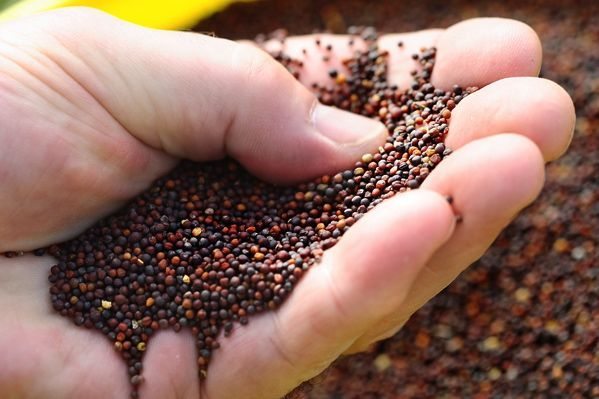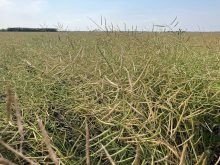A Prairie farmer who was paid up front for canola contractually committed to “commodity streaming” firm Input Capital Corp. will have to pay back most of that money, as per a court ruling which also condemns the company’s contracts with him as “unconscionable.”
Saskatchewan Court of Queen’s Bench Justice Jeffery Kalmakoff on Thursday released his ruling in a pair of actions filed by Input against Terry Gustafson, a farmer at Macoun, Sask., about 30 km northwest of Estevan.
Input filed against Gustafson in 2015 claiming breach of contract, and again last June also alleging breach of contract.
Read Also

Australian canola down but not out of China after Xi’s deal with Canada
A trade deal between China and Canada has damaged Australia’s hopes of becoming China’s main supplier of canola, but the Pacific nation’s access to the world’s biggest oilseed importer has significantly improved, traders and analysts said.
“To make a long story short, (Input) made the advance payments called for in the contracts to Mr. Gustafson, but Mr. Gustafson did not deliver the commodity required by the contracts,” Kalmakoff wrote.
Input, in a release Friday, hailed some aspects of Kalmakoff’s ruling, noting the court “ruled in Input’s favour on a number of issues which have been alleged in recent media reports.”
However, the company said, the court “did make certain findings that Input believes to be in error” and Input is “considering an appeal of these findings.”
Regina-based, publicly-traded Input deals in canola obtained from farmers by way of “multi-year streaming contracts,” including capital streams, marketing streams and, more recently, “mortgage streams,” billed as a “competitive alternative to traditional mortgage products.”
The company’s canola purchases generally involve up-front payments in return for agreed-upon tonnage over a specified number of years. At the end of March, Input reported a total of 353 active streaming contracts in the Prairie provinces, including 260 in Saskatchewan alone.
Gustafson, who owns “a large farming operation, even by contemporary standards,” with 15 owned and 85 rented quarter sections, was “under significant financial pressure” when he began reaching agreements with Input in the spring of 2014, the judge wrote.
Those included a purchase agreement for canola in April 2014; a streaming canola purchase contract later that month including a collateral mortgage and collateral security agreement; a streaming contract in late December that year, with a collateral security agreement and mortgage amending agreement; and an “amending agreement” in late March 2015.
The April 2014 purchase agreement, the judge wrote, was set up as a way to fulfill an earlier “spot” contract with Input under which Gustafson was advanced $800,000 to deliver 2,000 tonnes of canola to Viterra in Weyburn in March 2014. The farmer “was unable to deliver the canola to fill this contract because Viterra would not accept delivery.”
Kalmakoff rejected Gustafson’s claim that his agreement with Input amounted to “a partnership to produce and sell canola, where each party would share in the risks and the profits.”
‘Extra onus’
At the same time, he wrote, the relationship between Input and Gustafson “was not strictly vendor-purchaser or debtor-creditor” but “had elements of both.”
Thus, the judge found various statutes cited during the court case don’t apply to the relationship, including the Cost of Credit Disclosure Act, the Trust and Loan Corporations Act and the Unconscionable Transactions Relief Act.
On the other hand, he ruled, under the Farm Debt Mediation Act — which requires a “secured creditor” to serve notice before bringing an action against a farmer — Input meets the definition of a “secured creditor” through the language in its streaming contracts, collateral mortgage and collateral security agreement.
Therefore, Input was obligated to serve notice before launching its court claim against Gustafson, but “failed to do so.”
The judge also criticized Input and its vice-president, Gord Nystuen, for using their “positions of relative power in an unconscionable manner,” adding that the nature of its streaming contracts “places an extra onus on ICC to be diligent in assessing the financial stability of the farmers with whom it engages.”
The judge found that when Gustafson hadn’t delivered the canola required of him in 2014, Input instead advanced the farmer more money and negotiated a second contract making his delivery obligations “much more onerous.”
As the agreements piled up, Input, the judge wrote, wound up in a position of “increasing strength while driving Mr. Gustafson into a position of increasing weakness in their contractual relationship.”
In this case’s circumstances, Kalmakoff wrote, the various agreements between Input and Gustafson are “unconscionable” and “must be set aside.”
The agreements, he wrote, “reflect a highly profitable arrangement for ICC, which is almost entirely without risk.” To a farmer such as Gustafson, “the benefits appear generous at the front end, but the longer the contracts go on, the smaller the benefits, and the greater the risk.
“There is a substantial imbalance to start with, and the more dire the financial situation of the farmer, the more pronounced this imbalance becomes.”
But the judge also ruled he is “unable to conclude that the contracts should be rescinded” over any alleged misrepresentation on Input’s part.
The judge wrote he was satisfied that “any misunderstanding about the nature of the agreement came about more from Mr. Gustafson’s haste and carelessness than from any material misrepresentation by Mr. Nystuen.” Further, he wrote, he was unable to conclude any breach by Input of its contractual obligations to Gustafson.
Despite the judge’s finding that the contractual arrangement between Input and Gustafson was unconscionable, he wrote “it is clear that ICC paid Mr. Gustafson $4,500,000” and that Gustafson did not deliver any canola to Input while continuing to sell “significant quantities” of canola and other crops to other buyers.
Thus, Kalmakoff ruled he was “satisfied that Mr. Gustafson was unjustly enriched” and must be ordered to repay the money, minus proceeds Input gained from selling durum it took from Gustafson and sold in 2015. The judgment against Gustafson thus comes to just under $4.4 million, plus interest and “taxable costs.”
‘Damaged by seizure’
It’s not yet known how Kalmakoff’s ruling will affect other cases involving Input, among them a proposed class action filed on behalf of affected farmers by Regina lawyer Tony Merchant.
However, Merchant on Friday told CBC the Gustafson ruling “may mean the end of Input.”
Merchant on May 2 filed in Court of Queen’s Bench in Regina for representative plaintiff Morris Feduk of Melville, Sask., proposing a “class” of everyone who has had a contract with Input since October 2009 or has been “damaged by seizure” of assets by Input.
The action seeks to have the plaintiff’s and class’ indebtedness to Input either terminated or limited to the sums Input paid out to the farmers plus a “commercially fair” interest rate, along with general and punitive damages and costs.
Class members, Merchant’s statement of claim alleges, “were induced by Input to believe they could rely on help and assistance from Input and that Input would work together with class members in a sort of working partnership.”
Input, the statement alleged, “placed class members in a vulnerable position and would often provide funding while at the same time requiring new streaming contracts or renewal contracts to be undertaken.”
Merchant’s statement of claim also accuses Input of “predatory lending,” in which funds were “always advanced at the last possible moment” when it was “too late to undertake loans with another lender.”
‘Confidence’
Input, meanwhile, is continuing its recent launch of “mortgage streams,” which the company said last Wednesday “has gone better than expected, causing us to accelerate plans to add some term debt tied to mortgages and search out other avenues to fund mortgage deployment.”
Early signs “are excellent,” CEO Doug Emsley said in a release, adding that “without any significant promotion, Input’s internal investment committee has approved over $23 million in mortgages in just three months.”
During its quarter ending March 31, Input reported, it added 30 new producers to its streaming contract portfolio, including 20 in Saskatchewan and 10 in Alberta.
Canola prices have remained strong since last fall’s harvest, Input said last week, a fact that gives farmers “confidence in their own canola marketing programs this year, likely muting some potential uptake on marketing streams.”
Strong prices can contribute to Input’s returns on existing contracts, but can make it harder to acquire new ones, the company said. Weak prices reduce the company’s returns on existing contracts, “but can make it easier to add clients to our client list.” — AGCanada.com Network
CORRECTION, May 30, 2018: An earlier version of this article incorrectly stated the court’s ruling was released Friday rather than Thursday (May 17).















